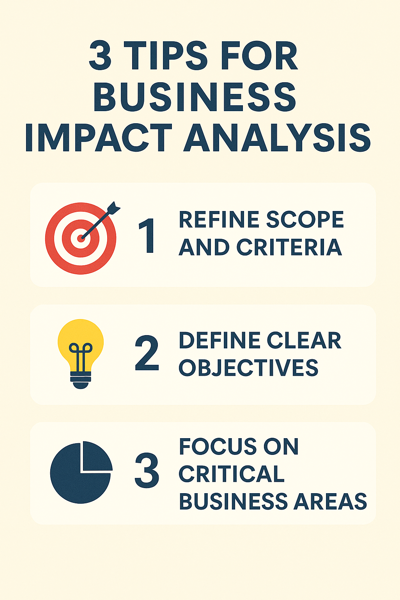The ability to swiftly recover from disruptions can make or break an organization. A well-executed Business Impact Analysis (BIA) is essential for understanding potential threats and ensuring business resilience. However, navigating the complexities of a BIA can often feel daunting without a structured approach.

Understanding the critical nature of refining the scope, enhancing data collection, and prioritizing recovery strategies is crucial for streamlining the BIA process. By clearly defining objectives and focusing on critical business areas, businesses can achieve precision and effectiveness. Advanced data collection methods like interviews, surveys, and collaborative workshops can provide the necessary insights to bolster BIA efforts.
This article delves into three actionable tips that will simplify and enhance the BIA process, enabling businesses to protect vital functions and streamline their continuity plans. By integrating these strategies, organizations can not only improve their BIA efficiency but also fortify their overall disaster recovery frameworks.
Refine Scope and Criteria for Precision
Setting a clear scope and criteria is vital for any effective Business Impact Analysis (BIA). Without it, organizations may find their analyses unfocused and too broad to be useful. Defining the scope ensures that the analysis aligns with strategic goals and current IT strategies. This alignment supports helpful decision-making at every level. Regular evaluation of the BIA’s original objectives keeps the analysis relevant as business operations and landscapes evolve. Moreover, a well-defined scope limits the chance of missing critical data, focusing the examination on essential business functions and risks. By clearly outlining criteria, the BIA can provide organizations with tailored insights, helping them adapt to new challenges over time.
Define Clear Objectives
Defining clear objectives is a fundamental step in the BIA process. When done right, it allows businesses to pinpoint key activities that must continue during potential disruptions. These clear objectives streamline the creation of a business continuity plan. They help align recovery plans with the company’s most pressing needs, reducing potential profit loss. Moreover, clear objectives aid in understanding process dependencies. This understanding is crucial for making informed decisions and mitigating potential risks. Proactively addressing these risks through well-defined objectives enhances an organization’s resilience and ensures a targeted recovery process.
Focus on Critical Business Areas
Focusing on critical business areas is a key aspect of an effective BIA. The process identifies essential business functions and assesses the impacts of any potential disruptions. This helps in developing recovery objectives, which are crucial for maintaining smooth operations. Unlike a risk assessment, a BIA does not focus on the likelihood of disruptions but rather on what happens if they occur. To get accurate insights, it is crucial to engage with people who have in-depth knowledge of specific business functions. By understanding the potential impacts of disruptions, the BIA aids in building solid contingency and recovery plans. Furthermore, a comprehensive BIA report documents these impacts, highlighting scenarios that may have severe financial consequences, thus guiding efficient resource allocation.
Enhance Data Collection Methods
A Business Impact Analysis (BIA) is a critical tool for understanding how disruptions can affect key business operations. It’s important for planning how to keep your business running during unexpected events. This process guides companies in figuring out which tasks are most important and how to bring them back after a problem. Collecting data is a big part of the BIA process and helps predict financial impacts from threats like natural disasters, cyberattacks, or supply chain issues. By gathering and using this data, organizations can become more resilient. This means they can handle disruptions better. A thorough BIA not only points out what’s important for recovery but also shows how different parts of the business depend on each other. This helps make smarter decisions in times of trouble.
Utilize Interviews for In-depth Insights
Interviews play a key role in the BIA process. They help gather detailed information about how different departments depend on each other and what critical processes need attention. Through interviews, you can uncover important resources and dependencies, like equipment and third-party support needs. This method also helps verify the data collected, ensuring there are no inaccuracies. When done well, interviews provide a solid foundation for the BIA. They lead to an organized view of potential disruptions. By talking to key people in the organization, you can dive deeper into the specifics. These interactions help build a comprehensive picture of the critical functions. This way, you’re better prepared to handle disruptions when they arise.
Implement Surveys for Broad Data Gathering
Surveys are another effective way to gather data during a BIA. Using structured questionnaire templates, you can collect information on important business functions. These templates offer a consistent way to document processes, which is useful for compliance and future assessments. Surveys help identify what activities and resources are crucial for delivering key products and services. By using them, organizations can spot potential impacts of disruptions on their vital operations. Surveys make it easier to evaluate recovery time objectives and dependency needs. They offer a broad perspective of the organization’s operations. This insight is crucial for forming an effective business continuity plan.
Conduct Workshops for Collaborative Input
Workshops are a great way to bring together different perspectives during the BIA process. They offer a space for company leaders, such as CFOs and HR heads, to discuss how disasters might impact finances and human resources. Engaging stakeholders through workshops ensures that all important business functions are identified and analyzed. This collaboration helps improve communication around risks and dependencies within the company. Attendees can share their views and experiences, which helps add depth to the analysis. Moreover, workshops allow for aligning definitions and processes. It provides a clear understanding of business continuity needs. By involving people in hands-on discussions, these workshops foster teamwork. This collective input strengthens the overall BIA process. It ensures the organization is prepared for any unexpected challenges.
Prioritize Recovery Strategies
When disaster strikes, knowing which systems to restore first can save a business. Prioritizing recovery strategies is about aligning these strategies with a company’s main goals. It’s crucial to identify critical processes and their dependencies to ensure smart resource use. A Business Impact Analysis (BIA) plays a key role here. It sets recovery time objectives and examines both financial and operational impacts. Clearly defining recovery priorities helps minimize business disruption. This might include having backup equipment ready or securing vendor support. By emphasizing clear recovery steps, an organization ensures its focus on reducing business impact effectively.
Identify Key Business Functions
Knowing which tasks are most critical is the heart of any business continuity plan. These functions need protection during unexpected events to keep business running smoothly. Sales management and supply chain management are examples of critical functions that need attention. A BIA helps pinpoint these essential tasks, ensuring that recovery resources are in place. Identifying these core activities helps set both Recovery Time Objectives (RTOs) and Recovery Point Objectives (RPOs). This guarantees they align with overall business continuity goals, maintaining operations and protecting key areas from disruptions.
Align with Business Continuity Plans
A BIA is more than a report; it’s a guide for preparing Business Continuity Plans (BCPs). By pinpointing potential disruptions and their impacts, the BIA ensures BCPs focus on real threats. This smart planning reduces the risk of overlooking critical processes during a crisis. The insights from a BIA play a crucial role in resource allocation too. When BCPs are backed by a strong analysis, they’re better at handling disasters with minimal financial and operational effects. Prepared organizations can quickly set recovery time objectives and craft effective recovery strategies, leading to a smoother response when disruptions occur.
Integrate into Disaster Recovery Frameworks
Disaster recovery frameworks heavily rely on a solid BIA. By defining essential recovery strategies, a BIA highlights the business areas needing urgent attention. This is crucial for setting up recovery point objectives (RPOs) and recovery time objectives (RTOs). Senior management uses these insights to decide which recovery strategies to implement following unforeseen events. The plans often include cost assessments of operational disruptions from the BIA, informing key decisions. This ensures efficient recovery of systems and data. In short, a BIA builds a strong foundation for recovering quickly, minimizing business downtime and protecting critical functions when faced with a disaster.
More Information and Assistance
MicroSolved, Inc. offers specialized expertise to streamline and enhance your BIA process. With years of experience in business continuity and risk assessment, our team can help you identify and prioritize critical business functions effectively. We provide customized strategies designed to align closely with your business objectives, ensuring your Recovery Time Objectives (RTOs) and Recovery Point Objectives (RPOs) are both realistic and actionable. Our approach integrates seamlessly with your existing Business Continuity Plans (BCPs) and Disaster Recovery frameworks, providing a comprehensive, cohesive strategy for minimizing disruption and enhancing resilience.
Whether you need assistance with the initial setup or optimization of your existing BIA procedures, MicroSolved, Inc. is equipped to support you every step of the way. Through our robust analysis and tailored recommendations, we enable your organization to better anticipate risks and allocate resources efficiently. By partnering with us, you gain a trusted advisor committed to safeguarding your operations and ensuring your business is prepared to face any unforeseen events with confidence.
* AI tools were used as a research assistant for this content, but human moderation and writing are also included. The included images are AI-generated.




 We are proud to announce a pandemic planning update webinar scheduled for Tuesday, March 17th at 10am Eastern.
We are proud to announce a pandemic planning update webinar scheduled for Tuesday, March 17th at 10am Eastern.